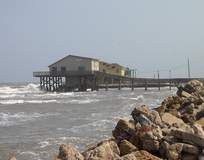- Northeast
- Mid-Atlantic
- South Atlantic
- Gulf Coast
- Better elevation maps Atlantic cloast
- Planning Maps
Maps of Lands Vulnerable to Sea Level Rise
Gulf Coast and Florida Download B&W Map (PDF, 2 pp, 336 KB) Download Color Map (PDF, 2 pp, 338 KB) |
Gulf Coast Download B&W Map (PDF, 2 pp, 301 KB) Download Color Map (PDF, 2 pp, 302 KB) |
| (Click on maps to see a larger image.) | |
West Gulf Coast Download B&W Map (PDF, 2 pp, 352 KB) Download Color Map (PDF, 2 pp, 353 KB) |
East Gulf Coast Download B&W Map (PDF, 2 pp, 273 KB) Download Color Map (PDF, 2 pp, 274 KB) |
| (Click on maps to see a larger image.) | |
Texas Shore Download B&W Map (PDF, 2 pp, 188 KB) Download Color Map (PDF, 2 pp, 189 KB) |
Note: Elevations are based on computer models, not actual surveys. Coastal protection efforts may prevent some low-lying areas from being flooded as sea level rises. The 1.5-meter contour depicted is currently about 1.3-meters above mean sea level. Therefore, some of the areas depicted in red will be above mean sea level for at least 100, and probably 200, years. However, because mean spring high water (i.e., high tide during new and full moons) is typically 60 cm above sea level, the 1.3-meter contour would be flooded a few times per month by a 70 cm rise in sea level. |
| (Click on maps to see a larger image.) | |
Over the next century, sea level is most likely to rise 55-60 cm along most of the U.S. Atlantic and Gulf Coasts. The 3.5-meter contour roughly illustrates an area that might be flooded over a period of several centuries.
